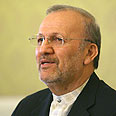
Foreign Minister Manouchehr Mottaki told reporters in Kuala Lumpur on Monday that Iran conveyed its stand to the International Atomic Energy Agency two days ago. Mottaki is in Malaysia to attend a meeting of foreign ministers of eight Islamic countries.
The statement could be seen as a softening of Iran's stand after senior Iranian lawmakers rejected the plan on Saturday. Earlier last week, Iran's President Mahmoud Ahmadinejad also said his government will persist with its nuclear program despite international concerns.
The UN-brokered plan would require Iran to send about 2,600 pounds (1,200 kilograms) — or 70% of its low-grade uranium stockpile — to Russia in one batch by year's end for processing. Subsequently, France would convert the uranium into fuel rods that would be returned to Iran for use in a reactor in Tehran that produces medical isotopes.
"We have considered these proposals. We have some technical and economic considerations on that. Two days ago, we passed our views and observations to the IAEA, so it is very much possible to establish a technical commission in order to review and reconsider all these issues," Mottaki said.
He did not elaborate.
If Iran accepts the UN-backed plan, it would not be able to replenish its stockpile to levels that would again yield enough enriched uranium for further enrichment into weapons-grade material for about a year.
Since its clandestine enrichment program was revealed seven years ago, Iran has amassed more than 3,300 pounds (1,500 kilograms) of low-enriched uranium at its cavernous underground facility at Natanz.
3 options
It is relatively simple to turn fuel-grade uranium into weapons-grade material. The West fears Tehran wants to do just that although Ahmadinejad's government says it is not interested in nuclear arms and wants only to create fuel for a planned network of reactors.
But it will take decades before the network is in place, meaning Iran has no immediate use for the enriched uranium it has accumulated. This has led many in the West to wonder why it wants to have the stockpile now if not for other purposes.
Mottaki said Iran has three options to procure fuel for its reactor, which was launched 40 years ago. The first is to buy the fuel from other countries, the second is to enrich the uranium domestically and the third is to accept the UN-brokered plan, he said.
Tehran says it will ship out a small amount of uranium and wait until it comes back in the form of fuel rods before exporting the next small batch. But this proposal has been rejected by the US and its allies, as it would leave Tehran with enough material to turn into a fissile core of a nuclear warhead.
Asked about US Secretary of State Hillary Clinton's comments that Western powers are getting impatient with Iran over the nuclear deal, Mottaki replied: "Really?"















